The USDA recently wrapped up a successful hackathon at Colorado State University. This event, which brought together computer science and data science students around a real USDA challenge, is a prime example of the many benefits that hackathons can offer. But what exactly is a hackathon, and why are they so beneficial?
A hackathon is an intensive event where participants collaborate to create solutions to specific problems. The fast-paced environment of a hackathon encourages creativity, innovation, and teamwork. By bringing together people from different backgrounds and disciplines, hackathons can foster cross-pollination of ideas and lead to the development of solutions that might not have been possible otherwise.
From April 4-6, representatives from USDA joined CSU at the downtown Fort Collins, CO campus, bringing together staff from USDA-OCIO, Agricultural Marketing Service (AMS), Food Safety Inspection Service (FSIS), CSU’s Computer Sciences and Animal Sciences programs, and the Ram Hack student organization to conduct the 24-hour data hackathon. USDA Deputy Secretary Xochitl Torres Small provided pre-recorded remarks, and the USDA Chief Data and AI Officer Christopher Alvares kicked off the event. Our event with CSU was developed around a real-world artificial intelligence use case for AMS. AMS is pursuing ways to expand their meat grading service and want to explore the use of image processing and artificial intelligence.
Over 60 CSU students across 18 teams were challenged to develop predictive models that could accurately estimate beef grade (e.g. Prime, Choice, Select) and fat thickness using images of beef ribeye's as they would appear to an AMS meat grader. Representatives from USDA provided technical assistance to many of the hackathon’s participants. Six teams were recognized for their accomplishments and will also receive letters of appreciation and an opportunity to meet with AMS on their project.
Prior to the start of the hackathon, a career fair was held with representatives from OCIO’s Office of the Chief Data Officer, Cybersecurity and Privacy Operations Center, Client Experience Center, and Digital Infrastructure Services Center. Representatives discussed core professional skills, resume tips, and internship opportunities at USDA. Students also heard about programs such as the US Digital Corps, GSA’s two-year tech fellowship program and a partner of USDA.
We hope to strengthen relationships with CSU and other universities to not only help address real USDA problems, but also inspire students and learners through hackathon events to hone their skills and consider a tech career in USDA and public service.







